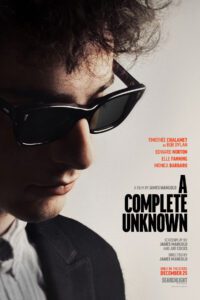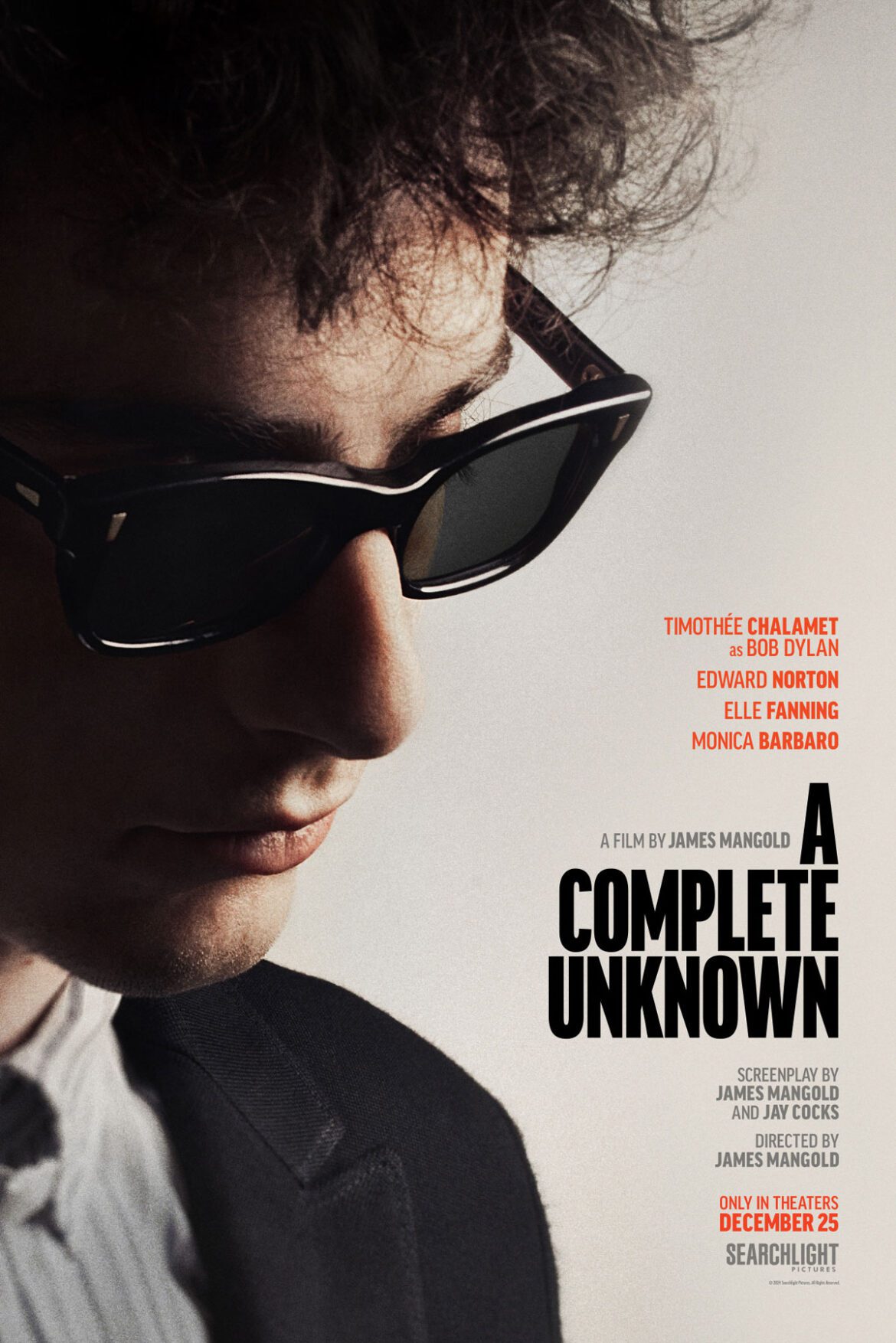
Director: James Mangold
Release Year: 2024
Runtime: 2h 21m
I’m notoriously prickly about biopics. Not a fan. Especially since it seems of late we can’t have ones about Jewish characters without slapping a prosthetic nose on them. A Complete Unknown no exception on this front. And, yes, I know Bob Dylan (and Leonard Bernstein and Golda Meir for that matter) has a prodigious schnoz, but really? I mean, at least they cast an actual Jewish-ish actor in Timothée Chalamet to play Dylan rather than hiring thee most goyisha actors on Earth, Bradley Cooper and Helen Mirren respectively, to play a famous chosen person. Granted, Dylan has a complicated history with his oscillating Judaism and Christianity over the years, but the fact we feel the need to focus on their noses and making them larger is just odd. To be fair, they do a decent job of taking Chalamet and transforming him into a pretty iconic-looking legend. So there’s that.
But back to my dislike of biopics. The whole process just kind of hems them in narratively and forces the writers to exaggerate and combine and basically make shit up. I suppose that’s why we get a lot of “inspired by” films. But those are generally less biopic than event-based realities. Something that happened, where there are real people involved, but the focus isn’t necessarily solely on one person like it is here. And, sure, Dylan is a singularly interested character who has done a lot of myth-building on his own — often times at odds with the truth — but because of that they could have a created a much more fantastical film. But for some reason they decided not to do that and to hold closer to facts than fantasy. I would have gone the Big Fish route with this thing. Or the Weird: The Al Yankovic Story direction. If Bob Dylan wants to say he joined a circus, then let’s assume that’s true and go with it. Fun! Instead, we lean into the “reality,” which in and of itself is also unreality. Because of the whole biopic trick of conflating events, inventing people and generally compressing time and space to make things fit in a two-hour movie. Because reality is actually kind of boring.
Full disclosure, I worked on the Bob Dylan website directly with his management for around two years back around 2010 at Columbia Records. That version of the site never launch in earnest before I left, but to this day you can see the absolutely bonkers amount of content database work I had to do on the website, cross referencing all of his songs, setlists, venues and various versions of all the traditional and original songs he’s played over the past 65 years. While I sat at my desk updating things in real time, I was regaled with stories about Dylan and his history by his representative as he watched me type over my shoulder. The man knew everything about him and could recite his setlist from some random show in 1975. So he knew his stuff. Point is, I was aware of Dylan’s fabulism and chicanery when it came to his personal history. Because growing up Robert Zimmerman in a middle-class Minnesota town to a close-knit family, having a typical high school experience, joining a fraternity freshman year of college and generally living a pretty vanilla existence just doesn’t speak to struggle. So why not invent a new name? And a new history — one that changes depending on the moment. Which is the impetus for calling the film A Complete Unknown.
Thing is, the film doesn’t seem to delve into or care to uncover the mysteries of Bob Dylan. He is a complete unknown because he’s not forthcoming with his history or his motivations. And when the movie wraps up, it’s still unclear. Clearly at the direction of James Mangold, Chalamet is told to have a flat affect and a kind of brooding demeanor. You wait and wait for that to break at any point and to get to know this complete unknown, but no. He’s pretty much at a four the entire film. Everything is muted and low-key. I don’t need ranting and raving, but even when characters are upset (not Dylan, of course), they just kind of roll a tear or, in the case of hippie hero Woody Guthrie (Ed Norton), just gently chastise him for his decisions with a banjo in his hands. The film uncovers nothing. It generally fails to entertain. Even though Mangold admits to “fictionalizing” some of the events to make it more compressed and digestible for an audience, he and it stick just close enough to the reality and not enough to the fantasy to make a straight-line yawn-fest.
Sure, it’s cool that Chalamet does some singing. Monica Barbaro makes for a very good looking version Joan Baez and holds her own singing as well. Frankly we learn a lot more about her than we do anyone else in the film. And her character is actually complex and interesting. It’s cool seeing NYC represented and the set design feels authentic. Of course I wasn’t born yet, so what do I know. But there wasn’t like a Tesla or an SUV driving by in the background or anything (so it’s already on better ground than The Squid and the Whale’s anachronistic parked cars). That said, there’s a naturalistic quality missing here. It feels like a bit of an uptight stage play at times rather than a lived-in film about a creative genius. There’s a shallowness and lack of depth across the board. Sure, we watch Dylan scribble in his lyrics book, but why is he writing these lyrics? How does this middle-class Jewish kid turn his completely normal upbringing and Midwestern sensibilities into being the voice of a generation? A poet? We see this process from 30,000 feet, but the filmmakers seem uninterested in exploring the how and why. Hollywood sheen on a biopic about a dude who should be fascinating, but comes off as an empty, mumbly vessel who kind of sleepwalks through his two-hour journey. And ours.


